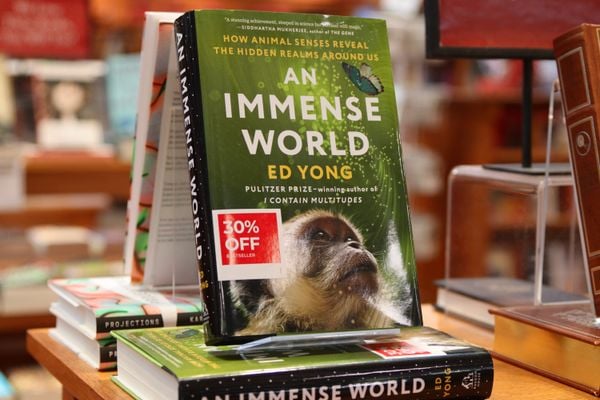As a kid, Elizabeth Hadly was always outside. Digging holes or climbing trees, she has always been “curious about the natural world.”
Years later, that deep curiosity about the environment led Hadly, now a biology professor in the new Doerr School of Sustainability and faculty director of the Jasper Ridge Biological Preserve to become the faculty member selected to choose the theme of the annual Three Books program: biodiversity.
This year’s selections were Lulu Miller’s book “Why Fish Don’t Exist,” Ed Yong’s book “Immense World” and Cyril Dion’s film “Animal,” works that Hadly said captured the “bewildering, magnificent, enthusiastic array of life on the planet.”
Friday’s event during New Student Orientation (NSO), where Yong and Dion joined Hadley in sharing their motivations and takeaways from their works with the Class of 2026, marked the latest in a tradition that dates back to 2004 when the Three Books program was launched. The program aims to create a shared intellectual experience for incoming frosh and transfer students.
Miller was unable to join the others in discussion and will instead speak to students in October as part of the first-year Civic, Liberal and Global Education curriculum.
The works emphasize the dynamic nature of biodiversity and its relationship to time and humanity, the speakers said.
“Immense World” explores the idea that by changing the environment, humans not only directly harm animals, but influence the unique and unseen ways they sense the world. “Why Fish Don’t Exist” is a book about Miller’s own life and the life of David Starr Jordan, a fish taxonomist who was also Stanford’s first president and a eugenicist. The film “Animal” documents the journey of teenagers Vipulan Puvaneswaran and Bella Lack in understanding the ecological crises caused by humans’ direct impacts to biodiversity.
Yong, a staff writer at The Atlantic, said he had a childhood that involved an encyclopedic fascination with animals which led to his later career as a scientific journalist. His book delves into the idea of the umwelt, a German word for the way different animals uniquely experience and perceive the world,
“I think [the umwelt] is a very humbling idea,” Yong said. “The reason I care about this to write a whole book about this is that I think it gives a sense of joy and curiosity and empathy about the entirety of the animal kingdom. As many species there are, there are new ways of experiencing the world that are different to us. Every time one of those species disappears, we lose a way of understanding the world.”
These sentiments were shared by Isaiah Davies ’26 who attended the NSO event.
“I think Yong’s book definitely changed my perspective about the outside world,” Davies said. “The day before I flew out here, I was sitting in my backyard, looking up at the stars, and I remembered from the book how he was talking about the noise pollution from planes. I guess it has made me a little bit more in tune to these sorts of impacts on the outdoors.”
Dion said he was inspired to create the new movie after feeling the “despair” of other young activists while attending global climate strikes, in order to shape new solutions to the climate crises away from the typical discourse over electric cars or decarbonization.
“To me, the core problems of the ecological crisis is the fact that at some point, we started to live in a narrative where the living world around us is a field of resources that we can exploit to make economical growth and to have new objects, new iPads and iPhones and cars and factories,” Dion said. “As long as we look at the world this way, without understanding that we are living creatures inside living ecosystems, and we are all interdependent, we will never solve any part of this crisis.”
The film centers on two activists who, at 18 years old, are the same age as many incoming students.
The youth of the activists also stood out to Hadly, who said the film made her “reminisce about losing my own innocence about the world.”
Before the event, Hadly told The Daily she hopes that this year’s program will encourage more students to think about the distinct ways they can contribute to solving global critical issues and better contextualize themselves in the world. With the topic choice, she also wants to impress the significance of biodiversity.
“Biodiversity is better, in my opinion, than every museum in the world,” Hadly said. “It’s more valuable than the Mona Lisa, which we could technically reproduce. We will never reproduce a wild ecosystem, no matter how much we think we know about how to do things.”
